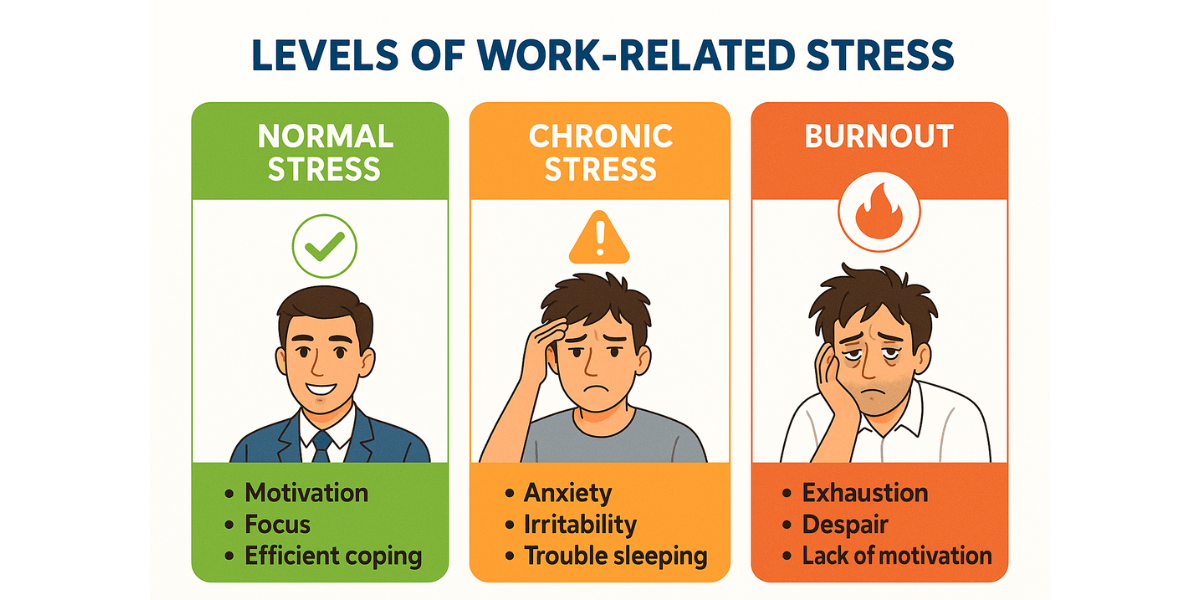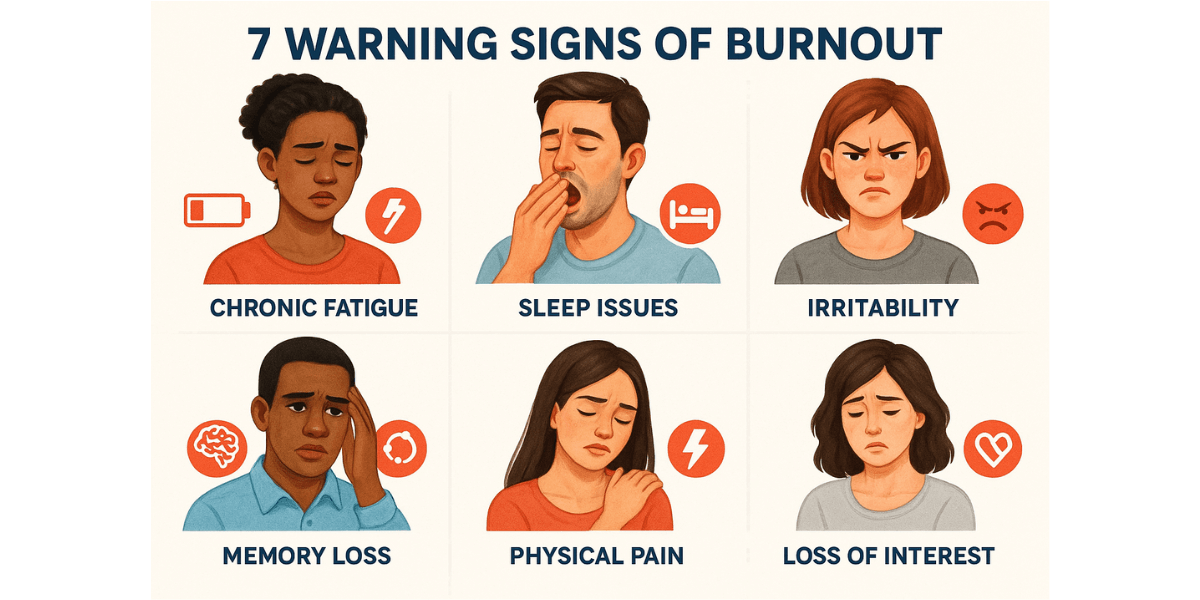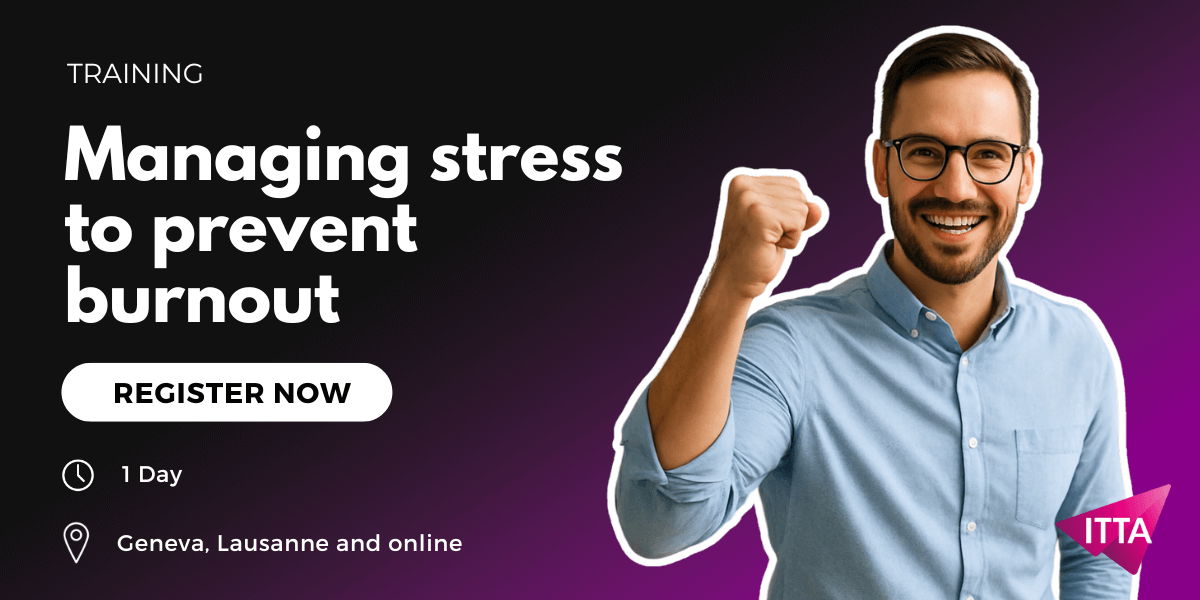Home > Managing Stress at Work to Prevent Burnout
Do you feel overwhelmed by stress at work, risking burnout? In this article, discover effective methods to prevent burnout, combining stress management, work-life balance, and scientifically proven techniques. We share concrete tips to manage stress and protect your mental health while staying calm in the face of professional overload.

The World Health Organization (WHO) defines burnout as a syndrome resulting from chronic workplace stress. It is not classified as an occupational disease in France but rather a state of physical, emotional, and mental exhaustion.
Burnout in Switzerland: current situation
(Sources: RTS, Swiss Health Promotion)
| Type of stress | Definition & Characteristics | Key symptoms | Consequences |
|---|---|---|---|
| Normal stress | Natural short-term reaction to challenges. Helps boost energy and concentration. | → Temporary increase in heart rate → Brief muscle tension → Intense but manageable focus | → Return to balance after the triggering event → No lasting effects if properly managed |
| Chronic stress | Prolonged or excessively intense stress. Exceeds the body’s coping mechanisms. | → Recurring sleep disorders → Constant anxiety → Eating disorders → Frequent irritability | → Around 28.2% of Swiss employees show an imbalance between job demands and resources → 30.3% feel emotionally drained at work → Estimated annual loss: 6.5 billion CHF to the Swiss economy |
| Burnout | Syndrome of extreme exhaustion (mental, emotional, physical) due to persistent work-related stress. | → Chronic fatigue → Loss of interest in work → Memory problems → Sleep disturbances | → 17% of Swiss workers have already experienced burnout → Higher risks in healthcare, education, and finance sectors |

Work overload, lack of control, value conflicts, and job insecurity increase the risks. Poor time management or lack of recognition further weaken workers.
Perfectionists, over-committed individuals, highly responsible people, or those with low self-esteem are more vulnerable. Their personality traits push them to exceed their limits without acknowledging their fatigue.
Chronic fatigue despite rest, sleep disturbances, recurring physical aches, excessive irritability, professional disengagement, loss of interest in activities, poor concentration — all signs that require immediate awareness.
Here are the 7 warning signs of burnout to monitor for your mental and physical health:

Mindfulness meditation involves intentionally focusing on the present moment without judgment. By cultivating this self-awareness, anxiety and cortisol levels the stress hormone are reduced. This practice strengthens the mind-body connection and improves the ability to cope with work-related tensions.
Studies show that 67% of meditation programs significantly reduce burnout symptoms. Neuroscientist Sara Lazar demonstrated that after eight weeks of regular practice, the brain’s cortex associated with memory and emotional regulation thickens. Mindfulness is therefore a key pillar of modern behavioral skills.
Even at the office, you can incorporate mindfulness micro-breaks: take a deep breath before replying to an email, pause for three minutes between tasks, or simply observe your breath while walking. These simple gestures, repeated regularly, build mental resilience and help prevent burnout.
Accessible apps like Petit Bambou (8 million downloads) or Insight Timer (20 million users) offer free guided sessions. They help anchor you in the present moment and are a practical, affordable, and discreet solution to mental overload at work.
The testimony of a doctor, exhausted by chronic overload, illustrates this well: after one week of an intensive MBSR retreat (Mindfulness-Based Stress Reduction), she regained clarity and inner balance. Her experience shows that mindfulness is not just a relaxation tool, but a genuine recovery method in times of crisis.

Slow breathing activates the parasympathetic nervous system, reducing stress. Cardiac coherence (6 breaths/minute) improves emotional regulation. In just 5 minutes, you can shift your state of mind to better handle work challenges.
4-7-8 technique: inhale for 4 seconds, hold for 7 seconds, exhale for 8 seconds. Repeat 3 times. Ideal before a stressful interview or to help fall asleep. Dr. Weil recommends it to quickly calm anxiety.
Cardiac coherence synchronizes heart and breath. Studies show it reduces cortisol. Practicing it for 5 minutes at 6 cycles/min activates your relaxation system. A simple solution for stressed workers.
Include strategic breathing breaks: after a tense email, before a presentation, between two calls. 1 to 3 minutes is enough to refocus. These micro-breaks prevent the buildup of mental tension at work.
Apps like RespiRelax+ (free) or Petit Bambou (free/subscription) guide beginners. They offer sessions to build resilience to stress, usable even during business travel.
Combine breathing with the 4-7-8 technique and time management. Better organization reduces triggering situations. This way, you enhance stress relief through a holistic approach to workplace well-being.

Here are 7 breathing exercises to relieve stress at work:
With ancient Indian origins, yoga connects body and mind to reduce stress. It lowers cortisol levels and activates the parasympathetic nervous system. Over 5,000 years, this practice has stood the test of time to become a pillar of modern burnout prevention.
Neck stretches, chair pose, or butterfly pose can be adapted for the office. In just 3 discreet minutes, you can release tension. These physical exercises help prevent work-related pain caused by prolonged sitting in front of screens.
Regular practice strengthens the work-life balance. Yoga supports the transition between professional and personal spheres. By calming the nervous system, it helps with letting go at the end of the day, preserving your mental health and energy.
Yoga prevents burnout through a holistic approach. It works on both body and mind simultaneously. By improving mental flexibility, this discipline helps you adapt to professional challenges without burning out.

Here are 7 accessible yoga poses at the office for your physical and mental well-being:
Chronic workplace stress can lead to burnout if ignored. Start now with proven methods: meditation, deep breathing, and yoga to boost your mental health. A balance between work and rest is not a luxury it’s a necessity. Acting today gives your future a path to lasting serenity.
How can I recover from burnout?
Start by acknowledging your exhaustion — it’s a crucial step. If getting out of bed is hard or you’re constantly tired, that’s a clear signal. Then, distance yourself from the stress source, even temporarily. Seek support: a professional can help you understand what you’re going through and rebuild healthy foundations.
How can I rest emotionally?
Allow your emotions to exist without running from them. Talk about them, write them down, or express them differently. Take time for yourself: walk in nature, meditate, reconnect with loved ones. And above all, learn to say no to protect your energy.
How long does burnout typically last?
It varies from person to person. On average, recovery may take around 18 months — sometimes more, sometimes less. It depends on stress intensity, duration of exposure, and the support received. Healing happens in stages, without rushing.
What is an anti-burnout routine?
Relearn how to listen to your body. Lighten your schedule, set boundaries, and build in breaks. Do gentle physical activity, take time for what recharges you, and avoid isolation. Most importantly, give yourself permission to slow down.

ITTA is the leader in IT training and project management solutions and services in French-speaking Switzerland.
Our latest posts
Subscribe to the newsletter

Nous utilisons des cookies afin de vous garantir une expérience de navigation fluide, agréable et entièrement sécurisée sur notre site. Ces cookies nous permettent d’analyser et d’améliorer nos services en continu, afin de mieux répondre à vos attentes.
Monday to Friday
8:30 AM to 6:00 PM
Tel. 058 307 73 00
ITTA
Route des jeunes 35
1227 Carouge, Suisse
Monday to Friday, from 8:30 am to 06:00 pm.